Bipolar Disorder Treatment For Teens
Learn more about bipolar disorder treatment for teens.
The NIH defines bipolar disorder as a mental disorder that causes unusual shifts in mood, energy levels, activity levels, concentration, and the ability to complete everyday tasks.
The moods that someone with bipolar disorder experiences involves periods of “up” that can be associated with elated or energized behavior. This is followed by periods of “down” where they may feel very hopeless and sad.
These patterns can be referred to as episodes of mania followed by depressive episodes. Less severe manic periods are referred to as hypomania or hypomanic episodes.
If a person experiences symptoms of bipolar disorder but does not fall into one of the three categories, it is referred to as “other specified and unspecified bipolar and related disorders.”
People are commonly diagnosed with bipolar disorder in later adolescence or adulthood. However, the symptoms can appear as early as childhood.
A health care provider can ask questions and assess your child’s mood changes, behavior, sleeping patterns, and energy levels. It can sometimes be difficult to diagnose bipolar disorder in children and teens because some symptoms share similarities with other mental health disorders that are common in adolescents.
Bipolar disorder can make it hard for teens and young adults to perform well in school, work, or maintain relationships with friends and family members.
Bipolar disorder was formerly known as manic-depressive illness or manic depression.
The ups and downs and manic symptoms that a teen with bipolar disorder experiences are much different than the common and normal mood swings a teenager goes through.
According to the National Institute of Mental Health, an estimated 2.9 % of adolescents ages 13 to 18 have bipolar disorder.
Treatment for teen bipolar disorder can help young people manage their symptoms and live the lives that they want.
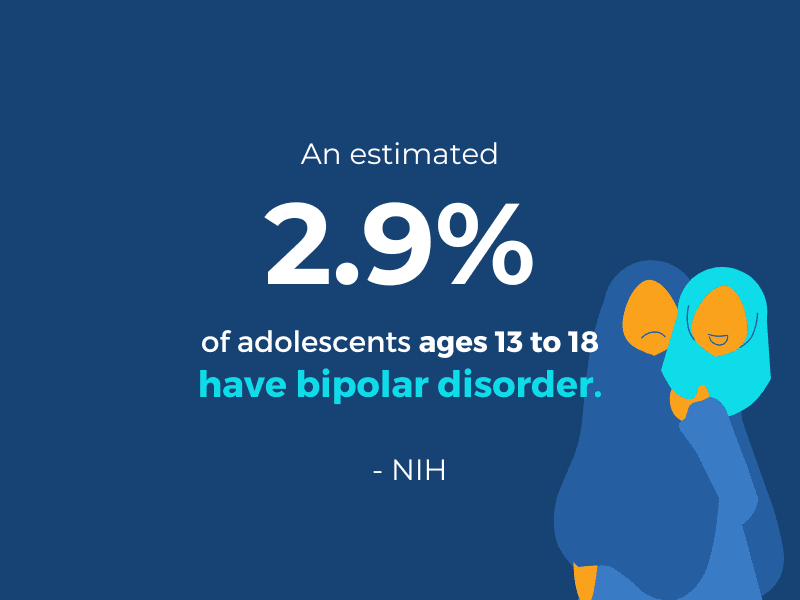
The symptoms of bipolar disorder can be different in every teenager.
Individuals may experience manic episodes, depressive episodes, or “mixed” episodes where they experience both manic and depressive symptoms.
Mood episodes cause symptoms that typically last from several days to several weeks. Symptoms also typically last every day for most of the day during an episode.
Mood episodes in bipolar disorder include:
Teens who are experiencing a depressive episode may face multiple symptoms.
If you or a loved one is experiencing suicidal thoughts, it is important to seek help immediately. You can call 911 or the National Suicide Prevention Hotline at 988.

We’re available 24/7 for help. Get started with treatment today.
If your teenager is bipolar, it is important to reach out for professional help and be there to provide support.
One of the main things you can do is educate yourself and your family about bipolar disorder.
By learning more, you can better understand the symptoms your teen may be experiencing, how to manage and cope, and how to provide support and care.
Educating yourself also involves researching different treatment options for teens with bipolar disorder. Every teen is unique, so the approach to treatment should be made to fit their specific needs. Get started with Sandstone Care’s accredited program today.

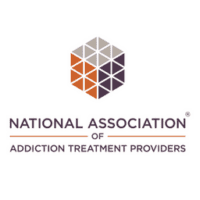

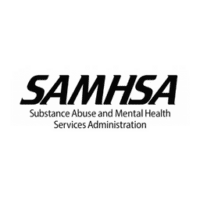

The Continuum of Care
Access a full range of treatments for mental health and substance use disorders. Whether you need a safe transitional living community, inpatient care, or outpatient therapy, we have a program to help.
The exact causes of bipolar disorder are unknown; however, a variety of different factors can contribute to it or trigger episodes.
Research suggests that genetics can play a role in the development of bipolar disorder. If a teen has a close family member with bipolar disorder, the chance of having the mental disorder is higher.
Research also shows that adversity, traumatic experiences, or traumatic life events can increase the chances of developing bipolar disorder in those genetically predisposed.
Experiencing stressful situations can trigger an episode in someone who is bipolar.
Symptoms of bipolar disorder share similarities with other mental health disorder symptoms.
ADHD, disruptive mood regulation disorder, oppositional defiant disorder, conduct disorders, and anxiety disorders can be mistaken for bipolar disorder.

It is normal for teenagers to be bipolar; however, the symptoms of other mental health disorders can be mistaken as bipolar disorder.
This is why it is important to receive a careful and thorough evaluation from a professional to give a proper diagnosis.
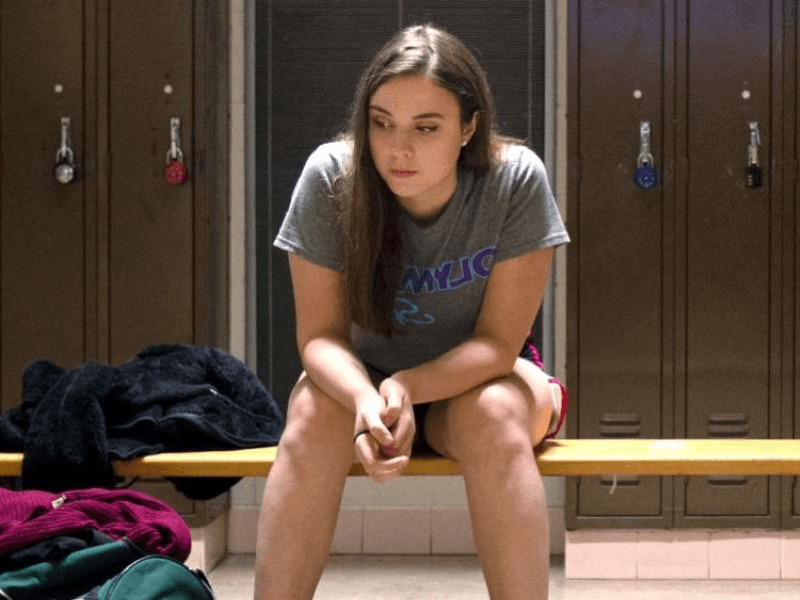

According to the National Institute of Mental Health, symptoms of bipolar disorder may come and go but do not go away on their own.
Treatment for teen bipolar disorder can help young people manage their symptoms and improve their quality of life.
Sandstone Care provides age specific care for those who struggle with substance use, mental health, and co-occurring disorders. We have treatment centers throughout the United States.
Teenagers experience many physical, mental, and emotional changes during puberty.
These changes can involve a lot of stress, and it could be hard to manage different challenges at once.
The teen brain is also undergoing significant development throughout their mid-twenties, so many teens may lack healthy coping skills, leading them to make hurtful or destructive decisions.
For a teen with bipolar disorder, the challenges associated with transitioning through puberty may cause extra stress in their lives, causing the symptoms of bipolar disorder to feel worse.
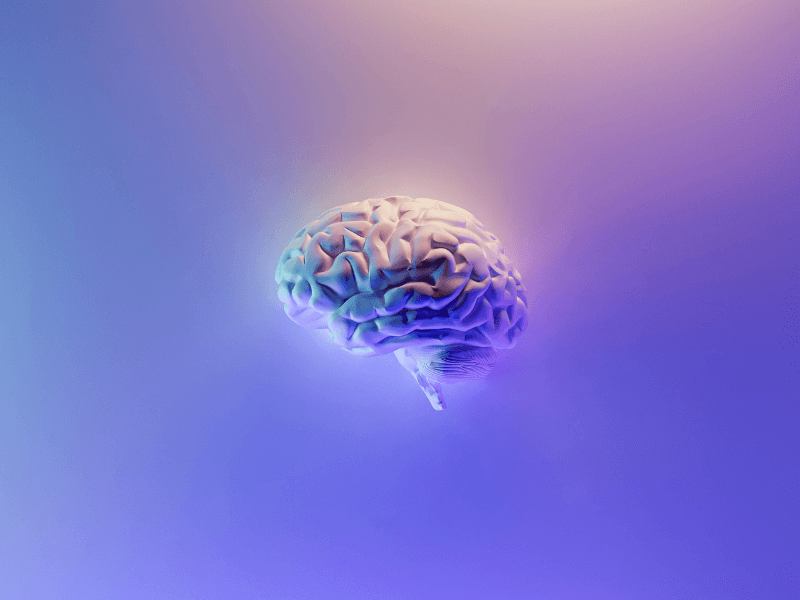

Treatment options for bipolar disorder in teens can include psychosocial therapy, medication, or a combination of both.
Some of the most common medications used to treat teens with bipolar disorder include antipsychotics, lithium, and antiepileptics drugs like lamotrigine.
When receiving help, a healthcare provider can work on developing an individualized treatment plan that fits the person’s needs.
Psychotherapy, also referred to as “talk therapy,” can be an important part of a bipolar disorder treatment plan.
Psychotherapy offers a variety of different treatment techniques that can help teens identify and change troubling emotions, thoughts, and behaviors.
If your teen is diagnosed with bipolar disorder, there are different ways you can help.
One is by being patient and understanding. Some symptoms of bipolar disorder can make it difficult for teens to relate to others or engage in healthy communication.
Understand that certain behaviors aren’t personal and that they may be a symptom of a mental disorder.
It is also helpful to let your teen know that you are there for them and encourage them to share things with you. When they do, pay attention and listen to what they have to say.
An essential part of helping your teenager with bipolar disorder is by educating yourself. Understand triggers, learn about the symptoms and research different treatment options.
The more you know, the better you can help your teen and your family.


5040 Corporate Woods Dr., Virginia Beach, Virginia, 23462
(888) 850-1890

16325 S Harlem Ave #260, Tinley Park, Illinois, 60477
(888) 850-1890Check out our selection of frequently asked questions — or call us to ask us today.
Research suggests that there is not one single cause for bipolar disorder and that several factors may contribute to it.
One factor is whether or not a close family member has a history of bipolar disorder or other mental illnesses.
Other research may also suggest that adversity, trauma, and stressful life events can put individuals at an increased risk of developing bipolar disorder in those genetically predisposed.
More research is being done on whether there is a difference in brain structure and function among those diagnosed with bipolar disorder.
A teen who may have bipolar disorder but may not be diagnosed yet can experience extreme mood swings, more than the usual amount of a typical teenager.
They can have negative feelings and thoughts, including sadness, worthlessness, and hopelessness. But, they may also go through periods of feeling incredibly happy or unusually silly.
Concentrating and remembering things can also be difficult, so their performance in school or work may decline.
However, many of these symptoms share similarities with other mental disorders, so it is important to see a professional for a proper diagnosis.
According to the NIH, research suggests that an individual’s chance of developing bipolar disorder is higher if they have a close family member with the illness.
However, the exact causes of bipolar disorder are unknown and may also come from several factors.
Famous people who have spoken out about their experiences with bipolar disorder include Mariah Carey, Kanye West, and Demi Lovato.
It is important for teens and young people to know that they are not alone if they are diagnosed or struggling with the symptoms of bipolar disorder.
Talking to others, attending support groups, or learning about others with bipolar disorder can help people learn more and relate to others.
Sometimes, people with bipolar disorder may turn to drugs to self-medicate.
However, some substances can cause the symptoms of bipolar disorder to worsen.
For example, drugs like cocaine and amphetamines can be associated with depressive symptoms after use, worsening symptoms that can be associated with symptoms of mania or symptoms of depression.
Some other mental health disorders share common symptoms with bipolar disorder.
This can include:
Because of some similarities between other mental illnesses and bipolar disorder, it can make it challenging to distinguish.
Children and teens who may be experiencing a manic episode can:
Sometimes, medication isn’t the best or most effective option for some people with bipolar disorder.
Counseling and behavioral therapies may help a person with bipolar disorder manage their symptoms without taking medication.
Behavioral therapies like CBT can help people understand their thoughts, feelings, and behaviors and build healthy coping mechanisms and skills to change them.


We understand taking the first step is difficult. There is no shame or guilt in asking for help or more information. We are here to support you in any way we can.